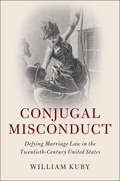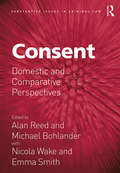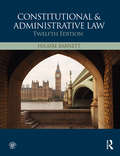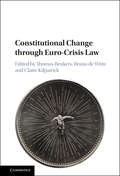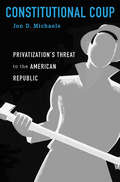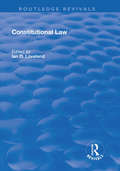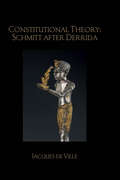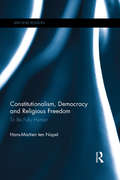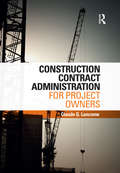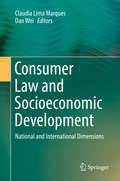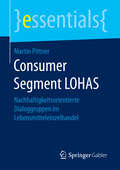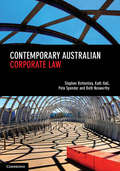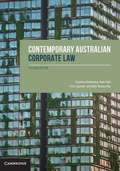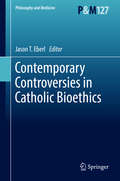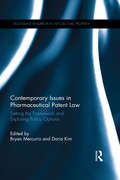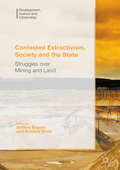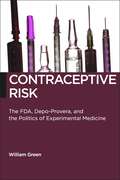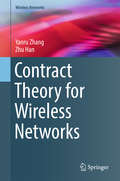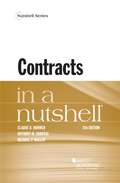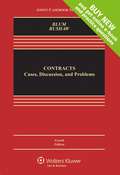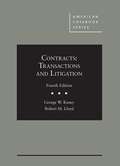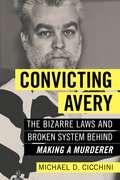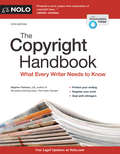- Table View
- List View
Conjugal Misconduct: Defying Marriage Law in the Twentieth-Century United States (Cambridge Historical Studies in American Law and Society)
by William KubyConjugal Misconduct reveals the hidden history of controversial and legally contested marital arrangements in twentieth-century America. William Kuby examines the experiences of couples in unconventional unions and the legal and cultural backlash generated by a wide array of 'alternative' marriages. These include marriages established through personal advertisements and matchmaking bureaus, marriages that defied state eugenic regulations, hasty marriages between divorced persons, provisional and temporary unions referred to as 'trial marriages', racial intermarriages, and a host of other unions that challenged sexual and marital norms. In illuminating the tensions between those who set marriage policies and those who defied them, Kuby offers a fresh account of marriage's contested history, arguing that although marital nonconformists composed only a small minority of the population, their atypical arrangements nonetheless shifted popular understandings of marriage and consistently refashioned the legal parameters of the institution.
Consent: Domestic and Comparative Perspectives (Substantive Issues in Criminal Law)
by Alan Reed Emma Smith Michael Bohlander Nicola WakeThis volume presents a leading contribution to the substantive arena relating to consent in the criminal law. In broad terms, the ambit of legally valid consent in extant law is contestable and opaque, and reveals significant problems in adoption of consistent approaches to doctrinal and theoretical underpinnings of consent. This book seeks to provide a logical template to focus the debate. The overall concept addresses three specific elements within this arena, embracing an overarching synergy between them. This edifice engages in an examination of UK provisions, with specialist contributions on Irish and Scottish law, and in contrasting these provisions against alternative domestic jurisdictions as well as comparative contributions addressing a particularised research grid for consent. The comparative chapters provide a wider background of how other legal systems' treat a variety of specialised issues relating to consent in the context of the criminal law. The debate in relation to consent principles continues for academics, practitioners and within the criminal justice system. Having expert descriptions of the wider issues surrounding the particular discussion and of other legal systems' approaches serves to stimulate and inform that debate. This collection will be a major source of reference for future discussion.
Constitutional & Administrative Law
by Hilaire BarnettHilaire Barnett’s Constitutional and Administrative Law has provided generations of students with reliable, accessible and comprehensive coverage of the Public Law syllabus. Mapped to the common course outline, it equips students with an understanding of the constitution’s past, present and future by analysing and illustrating the political and socio-historical contexts which have shaped the major legal rules and principles of public law, as well as on-going constitutional reform. The 12th edition will address key recent developments including: The referendum result on the UK’s membership of the EU and its ongoing impact on constitutional and administrative law The continuing process of devolution to the nations Terrorism and national security Future developments, particularly in relation to 'Brexit' will be discussed in regular updates to the companion website.
Constitutional Change Through Euro-Crisis Law
by Thomas Beukers De Witte Bruno Claire KilpatrickConstitutional Change through Euro-Crisis Law contains a comparative constitutional analysis of the impact of a very broad range of euro-crisis law instruments on the EU and national constitutions. It covers contrasting assessments of the impact of euro-crisis law on national parliaments, various types of criticism on the EU economic governance framework, different views on what is needed to improve the multilevel system of economic governance, and valuable insights into the nature of emergency discourse in the legislative arena and of the spillover from the political to the judicial sphere. In addition, it deals with how bailout countries, even if part of the same group of euro area Member States subject to a programme, have reacted differently to the crisis.
Constitutional Coup: Privatization’s Threat to the American Republic
by Jon D. MichaelsAmericans hate bureaucracy—though they love the services it provides—and demand that government run like a business. Hence today’s privatization revolution. Jon Michaels shows how the fusion of politics and profits commercializes government and consolidates state power in ways the Constitution’s framers endeavored to disaggregate.
Constitutional Law (Routledge Revivals)
by Ian D. LovelandThis title was first published in 2000: This volume of essays explores a number of fundamental constitutional law questions in a variety of historical and jurisdictional contexts. The contributions focus on the role to be played by courts and legal principles in the resolution of major political controversies and on the progressive development of constitutional jurisprudence in countries sharing a broadly common law legal tradition. The guiding theme pervading the collection is an attempt to measure the legitimacy of judicial (in-)activism when courts are faced with difficult political choices on matters such as slavery, internment, racism and voting rights and radical economic policies and are also confronted with the requirement to attach concrete meanings to such abstract concepts as the separation of powers and the rule of law.
Constitutional Theory: Schmitt After Derrida (Birkbeck Law Press)
by Jacques de VilleThis book advances a new reading of the central works of Carl Schmitt and, in so doing, rethinks the primary concepts of constitutional theory. In this book, Jacques de Ville engages in a close analysis of a number of Schmitt’s texts, including Dictatorship (1921), The Concept of the Political (1927), Constitutional Theory (1928), Land and Sea (1942), Ex Captivitate Salus (1950), The Nomos of the Earth (1950) and The Theory of the Partisan (1963). This engagement takes place from the perspective of constitutional theory and focuses specifically on concepts or themes such as sovereignty, the state, the political, constituent power, democracy, representation, the constitution and human rights. The book seeks to rethink the structure of these concepts in line with Derrida’s analysis of Schmitt’s texts on the concept of the political in Politics of Friendship (1993). This happens by way of an analysis of Derrida’s engagement with Freud and other psychoanalysts. Although the main focus in the book is on Schmitt’s texts, it further examines two texts of Derrida (Khōra (1993) and Fors: The Anglish Words of Nicholas Abraham and Maria Torok (1976)), by reading these alongside Schmitt’s own reflections on the positive concept of the constitution.
Constitutionalism and the Rule of Law
by Maurice Adams Anne Meuwese Ballin Ernst HirschRule of law and constitutionalist ideals are understood by many, if not most, as necessary to create a just political order. Defying the traditional division between normative and positive theoretical approaches, this book explores how political reality on the one hand, and constitutional ideals on the other, mutually inform and influence each other. Seventeen chapters from leading international scholars cover a diverse range of topics and case studies to test the hypothesis that the best normative theories, including those regarding the role of constitutions, constitutionalism and the rule of law, conceive of the ideal and the real as mutually regulating.
Constitutionalism, Democracy and Religious Freedom: To be Fully Human (Law and Religion)
by Hans-Martien ten NapelIn both Europe and North America it can be argued that the associational and institutional dimensions of the right to freedom of religion or belief are increasingly coming under pressure. This book demonstrates why a more classical understanding of the idea of a liberal democracy can allow for greater respect for the right to freedom of religion or belief. The book examines the major direction in which liberal democracy has developed over the last fifty years and contends that this is not the most legitimate type of liberal democracy for religiously divided societies. Drawing on theoretical developments in the field of transnational constitutionalism, Hans-Martien ten Napel argues that redirecting the concept and practice of liberal democracy toward the more classical notion of limited, constitutional government, with a considerable degree of autonomy for civil society organizations would allow greater religious pluralism. The book shows how, in a postsecular and multicultural context, modern sources of constitutionalism and democracy, supplemented by premodern, transcendental legitimation, continue to provide the best means of legitimating Western constitutional and political orders.
Construction Contract Administration for Project Owners
by Claude G. LancomeConstruction Contract Administration for Project Owners is aimed at public and private owners of real estate and construction projects. The book is intended to assist owners in their contractual dealings with their designers and their contractors. Most owners are not primarily in the business of designing and building facilities. The fact that their primary business is not design and construction places them at a disadvantage when negotiating, drafting, and administering design agreements and construction contracts because their designers and contractors use these documents every day. This book is intended to assist owners to redress this imbalance by equipping owners to draft and administer contracts so as to protect their interests. The book is aimed at owner personnel with all levels of knowledge in the business of managing projects. It can serve as a comprehensive introduction to drafting and administering design agreements and construction contracts for beginners. For intermediate level personnel, it can serve as a manual to be read to enhance the reader’s skills in this area. For the sophisticated project management professional, it can serve as a resource to be consulted in connection with very specific issues as they arise on a project.
Consultant & Independent Contractor Agreements
by Stephen FishmanDesigned for both independent contractors and the businesses who hire them, Consultant & Independent Contractor Agreements is the most comprehensive guide you’ll find anywhere. The book shows you how to: define the scope and duration of the work to be performed protect trade secrets, trademarks, patents, and copyrights satisfy IRS and other government agency requirements establish pay and other compensation avoid disputes. The new edition is completely updated to provide the latest rules and regulations for businesses and contractors. It includes step-by-step guidance and all the forms you'll need to draw up the necessary contracts.
Consumer Law and Socioeconomic Development: National and International Dimensions
by Dan Wei Claudia Lima MarquesThis book reflects the research output of the Committee on the International Protection of Consumers of the International Law Association (ILA). The Committee was created in 2008, with a mandate to study the role of public and private law to protect consumers, review UN Guidelines, and to model laws, international treaties and national legislations concerning protection and consumer redress. It has been accepted to act as an observer not only when the UNCTAD was updating its guidelines, but also at the Hague Conference on Private International Law. The book includes the contributions of various Committee members in the past few years and is a result of the cooperation between the Committee members and experts from Australia, Brazil, Canada and China. It is divided into three parts: the first part addresses trends and challenges in international protection of consumers, while the second part focuses on financial crises and consumer protection and the third part examines national and regional consumer law issues.
Consumer Segment LOHAS: Nachhaltigkeitsorientierte Dialoggruppen im Lebensmitteleinzelhandel (essentials)
by Martin PittnerDas essential vermittelt Wissen #65533;ber nachhaltigkeitsorientierte Zielgruppen wie Lifestyles of Health and Sustainability (LOHAS) in kompakter Form. Es wird der Frage nachgegangen, welchen Einfluss Corporate Social Responsibility (CSR) auf die Einstellung zu Lebensmitteleinzelh#65533;ndlern und Eigenmarken bei Kunden, insbesondere LOHAS hat, und welchen Beitrag CSR zur Wahrnehmung bzw. Kauf von Bio-Eigenmarken leisten kann. Die Ergebnisse der Studie zeigen, dass die von SINUS identifizierte Wertestruktur der LOHAS in Deutschland in den Grundz#65533;gen auch f#65533;r #65533;sterreich nachgewiesen werden kann. Zudem werden Empfehlungen f#65533;r die Unternehmenspraxis aufgezeigt, mit welchen Kommunikationsstrategien Konsumenten bzw. LOHAS am besten angesprochen werden k#65533;nnen.
Contemporary Australian Corporate Law
by Stephen Bottomley Kath Hall Peta Spender Beth NosworthyContemporary Australian Corporate Law provides an authoritative, contextual and critical analysis of Australian corporate and financial markets law, designed to engage today's LL. B. and JD students. Written by leading corporate law scholars, the text provides a number of features including: a well-structured presentation of topics for Australian corporate law courses, consistent application of theory with discussion of corporate law principles (both theoretical and historical), comprehensive discussion of case law with modern examples, and integration of corporate law and corporate governance, all with clarity, insight and technical excellence. Central concepts are enhanced with dynamic and relevant discussions of corporate law in context, including debates relating to the role of corporations in society, the global convergence of corporate law as well as corporations and human rights. Exploring the social, political and economic forces which shape modern corporations law, Contemporary Australian Corporate Law encourages a forward-thinking approach to understanding key concepts within the field.
Contemporary Australian Corporate Law
by Stephen Bottomley Kath Hall Peta Spender Beth NosworhtyContemporary Australian Corporate Law is a highly-regarded introduction to corporate law in Australia that provides an authoritative, contextual and critical analysis of the law governing Australian corporations and financial markets. It explores the rules, principles, doctrines and policies that constitute corporate law in Australia within their legal, social, economic and political contexts. Clearly and precisely written, this edition has been thoroughly updated and refined to reflect current Australian corporate law, including recent case law, changes to the Corporations Act 2011 and the impact on the corporate sector of the Financial Services Royal Commission. Written by leading legal scholars, Contemporary Australian Corporate Law will assist students to develop a critically informed understanding of corporate law and the role of corporations in contemporary society.
Contemporary Controversies in Catholic Bioethics (Philosophy and Medicine #127)
by Jason T. EberlThis volume comprises various viewpoints representing a Catholic perspective on contemporary practices in medicine and biomedical research. The Roman Catholic Church has had a significant impact upon the formulation and application of moral values and principles to a wide range of controversial issues in bioethics. Catholic leaders, theologians, and bioethicists have elucidated and marshaled arguments to support the Church's definitive positions on several bioethical issues, such as abortion, euthanasia, and reproductive cloning. Not all bioethical issues, however, have been definitively addressed by Catholic authorities, and some Church teachings allow for differing applications in diverse circumstances. Moreover, as new biomedical technologies emerge, Church authorities rely on experts in science, medicine, philosophy, theology, law, and other disciplines to advise them. Such experts continue to debate issues related to reproduction, genetics, end-of-life care, and health care policy. This volume will be a valuable resource for scholars in bioethics or Catholic studies, who will benefit from the nuanced arguments offered based on the latest research. This volume is also instructive for students entering the field to become aware of the founding philosophical and theological principles informing the Catholic bioethical worldview.
Contemporary Issues in Pharmaceutical Patent Law: Setting the Framework and Exploring Policy Options (Routledge Research in Intellectual Property)
by Bryan Mercurio and Daria KimThis collection reflects on contemporary and contentious issues in international rulemaking in regards to pharmaceutical patent law. With chapters from both well-established and rising scholars, the collection contributes to the understanding of the regulatory framework governing pharmaceutical patents as an integrated discipline through the assessment of relevant laws, trends and policy options. Focusing on patent law and related pharmaceutical regulations, the collection addresses the pressing issues governments face in an attempt to resolve policy dilemmas involving competing interests, needs and objectives. The common theme running throughout the collection is the need for policy and law makers to think and act in a systemic manner and to be more reflective and responsive in finding new solutions within and outside the patent system to the long-standing problems as well as emerging challenges
Contested Extractivism, Society and the State: Struggles over Mining and Land (Development, Justice and Citizenship)
by Bettina Engels Kristina DietzThis book empirically discusses recent struggles over land and mining, exploring state-society relations conflicts on various scales. In contrast with the existing literature, analyses in this volume deliberately focus on large-scale land use changes both in relation to the expansion of industrial mining and to agro-industry. The authors contend that there are significant parallels between contestations over different variants of resource extractivism, as they reflect the same global trends and processes. Chapters draw on critical theoretical approaches from political ecology, political economy, spatial theory, contentious politics, and the study of democracy. The authors not only provide empirical insights on actual resource struggles from different world regions based on in-depth field research, but also contribute to theory-building by linking concepts from various critical approaches to one another, developing a perspective for analysing struggles over resources related to current global crisis phenomena.
Contraceptive Risk: The FDA, Depo-Provera, and the Politics of Experimental Medicine (Biopolitics #12)
by William GreenThe story of Depo-Provera joins the national struggle over the drug's FDA approval to the state legal issues raised by its contraceptive and criminal justice uses.Depo-Provera is known as an injectable hormonal birth control method, but few are familiar with its dark and complicated history. Depo-Provera was tested on women since the mid-1960s without their informed consent until it was FDA-approved in 1992, but never FDA-approved as chemical castration for male sex offenders.Contraceptive Risk is William Green's landmark study of Depo-Provera. Based on a fascinating combination of archival materials and interviews, the book is framed as three interconnected stories told by Judith Weisz, who chaired the FDA's Public Board of Inquiry on Depo-Provera, a scientific court; by Anne MacMurdo who brought a products liability suit against Upjohn, the drug's manufacturer, for the deleterious side effects she suffered from the drug's use; and by Roger Gauntlett, an Upjohn heir who, when he was convicted of sexual assault, refused to take a dose of his family's own medicine as a probation condition. Together these three stories of Depo-Provera's convoluted fifty year odyssey call for a paradigm shift in pharmaceutical drug development.Contraceptive Risk is a thoroughly researched and engrossing approach to the scientific, political and institutional forces involved in health law and policy, as well as the multifaceted politics of measuring risk.
Contract Theory for Wireless Networks (Wireless Networks)
by Zhu Han Yanru ZhangThis book presents theoretical research between wireless communications, networking, and economics using the framework of contract theory. This work fills a void in the literature by closely combining contract theoretical approaches with wireless networks design problems. Topics covered include classification in contract theory, reward design, adverse selection, and moral hazard. The authors also explore incentive mechanisms for device-to-device communication in cellular networks, insurance plans for service assurance in cloud computing markets with incomplete information, multi-dimensional incentive mechanisms and tournament based incentive mechanisms in mobile crowdsourcing. Financial applications include financing contracts with adverse selection for spectrum trading in cognitive radio networks and complementary investment of infrastructure and service providers in wireless network visualization. This book offers a useful reference for engineers and researchers in the wireless communication community who seek to integrate the notions from contract theory and wireless engineering, while emphasizing on how contract theory can be applied in wireless networks. It is also suitable for advanced-level students studying information systems or communications engineering.
Contracts In A Nutshell (Nutshells Series)
by Claude Rohwer Anthony Skrocki Michael MalloyThis Nutshell provides a comprehensive guide to the law of contracts. It contains expert explanations of contract concepts under both the common law and Article 2 of the Uniform Commercial Code. It also includes the basics of the Law of Restitution and an introduction to digital contracting.
Contracts: Cases, Discussion, and Problems (Aspen Casebook)
by Brian Blum Amy BushawContracts: Cases, Discussion, and Problems, Fourth Editionis known for its strikingly clear, straightforward text that illuminates cases as well as concepts and theory. The book focuses on modern cases to expose students to contemporary contract law, but it also includes many important or iconic older cases. Numerous problems, ranging from simple to complex, supplement cases and introduce topics taught most effectively through problems. The casebook s traditional organization begins with formation and then corresponds to the sequence followed by the Restatement (2nd) of Contracts and treatises. Procedural issues are highlighted when presented by the cases and transactional issues such as drafting, client counseling, and negotiation are raised through the use of questions and small exercises throughout the text. Strengthening the text s focus on contemporary methods of contracting, modern issues in standard contracts are explored along with contracts entered into electronically. International and comparative material offers alternative approaches for students to consider, such as those taken by the United Nations Convention on Contracts for the International Sale of Goods (CISG) and the UNIDROIT Principles of International Commercial Contracts.
Contracts: Transactions and Litigation (Fourth Edition) (American Casebook Series)
by George W. Kuney Robert M. LloydContracts: Transactions and Litigation (Fourth Edition), compares and contrasts the common law of contracts, the Restatement of the Law Second-Contracts, and Uniform Commercial Code Article 2 rules, as well as the United Nations Convention on Contracts for the International Sale of Goods and the UNIDROIT Principles of International Commercial Contracts, and explores their evolution and application.
Convicting Avery: The Bizarre Laws and Broken System behind "Making a Murderer"
by Michael D. CicchiniThe shocking Netflix documentary Making a Murderer left millions of viewers wondering how an apparently innocent man could be wrongfully convicted - not just once, but twice. This book explains, in plain English, the numerous flaws in Wisconsin's criminal justice system that led to the wrongful convictions of Steven Avery and his mentally challenged nephew Brendan Dassey. Equally disturbing, it also reveals that similar flaws exist in other jurisdictions of the country.The author, himself a criminal defense attorney in Wisconsin, details the egregious procedures that resulted in the Avery and Dassey convictions. Besides the use by law enforcement of suggestive eyewitness-identification methods and interrogation tactics known to produce false confessions, defense lawyers had their hands tied by a truth-suppressing trial rule. Though they had evidence that someone other than Avery murdered Teresa Halbach, Wisconsin courts rarely permit consideration of such evidence. Perhaps most troubling, the burden of proof in this state is actually much lower than the constitutionally-mandated "beyond a reasonable doubt" standard. The author not only discusses the documentary, but he also quotes from and cites Avery's and Dassey's appellate court decisions, appellate court briefs, numerous trial court documents, other cases, law review articles, and scientific studies. This unsettling book will give you facts and insights beyond those presented in the documentary and leave you wondering whether the constitutional right to a fair trial is actually guaranteed where you live.From the Trade Paperback edition.
Copyright Handbook, The: What Every Writer Needs to Know
by Stephen FishmanWhat copyright law protects....and doesn't No writers like to see their hard work or creativity copied by others - or to be accused of copying. Fortunately, The Copyright Handbook provides everything you need to protect yourself! Find information and forms to help you: register your work maximize copyright protection transfer ownership of copyright avoid infringement deal with infringers understand the "fair use" rule get permission to use copyrighted work profit from your copyright This edition is updated to provide the latest copyright regulations, forms and rules for filing a copyright application.
